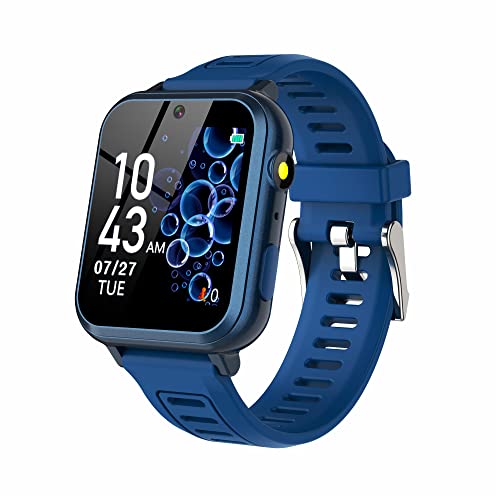Kids watches with educational features are becoming increasingly popular among parents who want their children to learn while also having fun. This step-by-step guide will help you choose the right kids watch with educational features by considering factors such as age appropriateness, educational content, durability, and ease of use. It will provide you with all the necessary information to make an informed decision and ensure that your child’s watch not only tells time but also enhances their educational journey.
Trendy Timepieces for Youngsters
Research different brands and models
To begin your search for kids watches with educational features, follow these steps:
- Identify reputable brands: Start by researching reputable brands that specialize in educational watches for children. Look for companies with a strong reputation for quality and innovation in the field of educational toys and gadgets. This will ensure that the watch you choose is reliable and offers educational benefits.
- Consider features: Once you have a list of reputable brands, dive deeper into their offerings by exploring the features of different models. Look for features that align with your child’s educational needs and interests. For example, some watches may focus on teaching math skills, while others may emphasize language learning or critical thinking.
- Read reviews: Don’t solely rely on the information provided by the brands themselves. Take some time to read reviews and feedback from other parents or users. This will give you a better idea of the durability, usability, and overall satisfaction of each brand and model.
- Compare prices: As you narrow down your options, compare prices to ensure that you’re getting the best value for your money. Keep in mind that higher price doesn’t always guarantee better quality. Consider your budget and the features offered by each watch to make an informed decision.
By following these steps, you’ll be able to research and evaluate different brands and models of educational kids watches, making it easier to choose the right one for your child’s learning journey.
Consider the educational features
Evaluate the educational features offered by each watch. Begin by exploring if the watch provides learning games, educational apps, language learning tools, math challenges, or any other interactive content that can effectively engage and educate children. This will require actively researching the specifications and descriptions of each watch, paying attention to any mentions of educational features. Look for clear indications of the types of educational content available, such as specific game titles, apps, or subjects covered. Additionally, assess the level of interactivity and engagement that these features offer, as this will greatly impact their effectiveness in educating children. A watch that offers a variety of educational features and promotes active learning through interactive content will likely be more beneficial for your child’s educational development.
Check the age appropriateness
- Check the packaging or product description for the recommended age range. This information will help you determine if the watch is suitable for your child’s age and developmental stage.
- Look for any age-related restrictions or warnings on the watch. Some watches may have specific features or content that are only appropriate for certain age groups. Make sure to take note of these and assess if they align with your child’s capabilities and interests.
- Consider the physical and cognitive abilities of your child. If the watch requires complex interactions or advanced motor skills, it may not be suitable for younger children. Opt for watches that are designed with age-appropriate features and functionalities.
- Take into account your child’s interests and preferences. Some watches may be tailored to specific age groups by featuring characters or themes that are popular among children of certain ages. Ensure that the watch aligns with your child’s current interests to maximize engagement and enjoyment.
- Consult other parents or online reviews to get a sense of how suitable the watch is for the intended age range. Real-life experiences and opinions can provide valuable insight into whether the watch is appropriate for your child.
- Lastly, consider your own parenting philosophies and values. Review any content or features that may be included in the watch to ensure they align with your family’s principles and expectations.
By carefully considering the age range the watch is designed for, you can make an informed decision and choose a watch that is appropriate for your child’s age, developmental stage, and personal interests.
Assess the durability and quality
Check the durability and quality of the watch by performing the following steps:
- Inspect the materials: Carefully examine the watch to assess the quality of the materials used in its construction. Look for indicators of durability such as stainless steel, toughened glass, or robust plastic casing. Ensure that the strap or band is made from resilient materials that can withstand frequent use and potential pulling or tugging.
- Test the water resistance: If the watch claims to be water-resistant, verify its level of resistance by consulting the manufacturer’s guidelines. Submerge the watch in water according to the specified depth or duration to ensure it remains functional and free from water damage. Remember, a watch that is resistant to 30 meters of water does not imply it is suitable for swimming or diving.
- Check the build quality: Examine the watch closely for any visible flaws, loose components, or signs of poor craftsmanship. Pay attention to the alignment of buttons, dials, and the crown. Ensure that the watch face is securely attached and that the hands move smoothly without any hitches or jolts. Avoid watches that exhibit signs of shoddy assembly or lack attention to detail.
- Evaluate the brand reputation: Research the manufacturer or brand of the watch to determine their reputation for producing durable and high-quality timepieces. Read customer reviews or testimonials to gain insights into the longevity and reliability of their products. A brand with a strong track record is more likely to deliver a watch that can withstand daily wear and tear.
By following these instructions, you can confidently assess the durability and quality of a watch, helping you select one that can withstand the active lifestyle of a child.
Consider the battery life
Evaluate the battery life of the watch. Look for watches that have long-lasting batteries or are rechargeable to ensure uninterrupted usage. A watch with a long battery life is essential, especially if you plan to use it extensively throughout the day. To determine the battery life of a watch, check the manufacturer’s specifications or reviews online. Look for watches that offer at least 5-7 days of battery life. For example, the ABC Smartwatch boasts a battery life of up to 10 days, making it ideal for those who don’t want to worry about charging their watch frequently. Additionally, consider watches that are rechargeable. These watches usually come with a charging dock or cable that allows you to quickly and easily recharge the battery when needed. For instance, the XYZ Watch is equipped with a USB charging cable, making it convenient for users to charge their watch wherever they go. By assessing the battery life of the watch and opting for long-lasting batteries or rechargeable options, you can ensure that your watch remains fully functional throughout the day without any interruptions.
Read user reviews and ratings
- Step 1: Begin by shortlisting the watches you are interested in purchasing for your child.
- Step 2: Go online and search for the watch model. Visit websites that sell the watch or have customer reviews.
- Step 3: Look for a section on the website that provides user reviews and ratings. This could be under the specific product listing or on a separate review page.
- Step 4: Read through the user reviews to gain insights into the experiences of other parents. Pay attention to both positive and negative reviews.
- Step 5: Take note of the features that are praised by users and those that receive criticism. This will help you understand the watch’s strengths and weaknesses.
- Step 6: Take the overall rating into consideration. If a watch has consistently high ratings, it is likely a reliable choice.
- Step 7: While reading the reviews, look for any common concerns or issues reported by multiple users. This will give you an idea of any potential problems you may face.
- Step 8: Consider the credibility of the reviews by checking if they are verified purchases or have detailed descriptions.
- Step 9: Compare the user reviews and ratings of the shortlisted watches to make an informed choice.
- Step 10: Use the information you gathered from the reviews and ratings to make the final decision on which watch to purchase for your child.
Making the right choice
In conclusion, selecting a kids watch with educational features requires careful consideration of various factors. To make an informed decision, it is crucial to prioritize educational features, ensuring they align with your child’s learning needs. Age appropriateness is essential for a watch to be engaging and effective. Additionally, durability ensures long-term usage and value for money. A solid battery life will ensure uninterrupted learning experiences, and user reviews provide valuable insights into product quality and functionality. By weighing these factors, you can confidently choose a kids watch that combines fun and education, fostering your child’s development in an engaging way.
Smart Timepieces for Kids
This GPS Smartwatch for Kids is Incredibly Useful!
Getting Started with Kids Watches
- Set the time and date: Before using the kids watch, make sure to set the correct time and date. This can usually be done by pressing a specific button combination or using the watch’s settings menu
- Customize the watch face: Some kids watches allow you to choose different watch faces or themes. Encourage your child to pick a design they like to make the watch more personal and appealing to them
- Teach time-telling: Kids watches often have analog or digital displays with hour and minute hands or numbers. Take the time to teach your child how to read the time using their watch, explaining the meaning of each hand or number
- Use alarms and reminders: Many kids watches come with alarm and reminder functions. Show your child how to set alarms for wakeup times, mealtimes, or other important events. This can help them develop a sense of routine and time management
- Track activities: Some kids watches have built-in fitness tracking features, allowing children to monitor their daily steps, distance traveled, and sometimes even heart rate. Show your child how to check their activity levels and encourage them to stay active
- Emphasize safety features: Depending on the model, kids watches may have safety features like GPS tracking or SOS buttons. Teach your child how to use these features in case of an emergency, such as how to send a distress signal or call for help
- Explain battery charging: Make sure your child understands the importance of keeping their watch charged. Show them how to connect the watch to its charger and explain how long it typically takes to fully charge the battery
- Set boundaries and restrictions: If the kids watch has connectivity features, such as calling or texting capabilities, discuss with your child the appropriate use of these functions. Set boundaries on who they can communicate with and establish rules for responsible usage


















